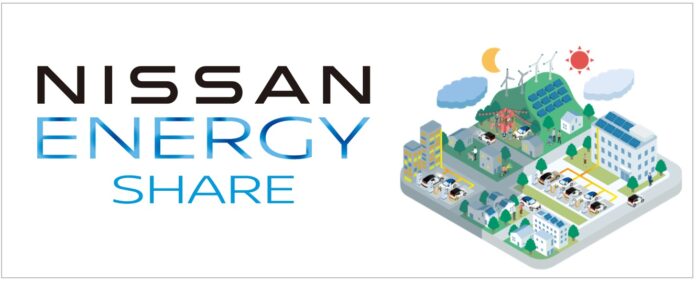Nissan Motor Co., Ltd. has announced it will launch Nissan Energy Share in Japan on March 1 to further unlock the value of electric vehicles. The new service features Nissan-unique energy management technology that controls the charging and discharging of EV batteries.
Nissan has been researching the most efficient ways of managing energy through studies and field tests in locations such as Namie, Fukushima, and validating its proprietary technologies for autonomously charging and discharging EV batteries.
Nissan Energy Share was born of this effort. Offered primarily to companies, businesses and municipal governments, the service is designed to enable optimal energy management in line with the needs and circumstances of customers. It offers a one-stop service experience from planning and system build-out to maintenance operations.
Intelligent charging management system: The heart of Nissan Energy Share
EV batteries do more than power vehicles. They’re mobile energy units capable of directly powering buildings and communities. Nissan’s intelligent charging management system helps realize the full potential of EVs. Featuring a charge-discharge controller connected to charging or charge-and-discharge units, the system predicts vehicles’ energy usage. It obtains real-time information on a vehicle’s remaining charge as well as energy use in buildings and autonomously determines the optimal timing to charge and discharge. The technology allows energy load shifting and peak shaving without compromising the performance or comfort of the vehicle. When connected to solar panels, users can directly consume off-grid renewable energy produced on site, contributing to decarbonization.
Key aspects
1. Load shifting through smart charging
Through real-time monitoring of energy usage in buildings and remaining EV battery charge, the system delivers smart control over the optimal timing for charging EVs. In addition, utilizing multiple EVs does not affect buildings’ use of electricity.
2. Peak shaving through discharge management
The system helps shave peak power usage in buildings by supplying power from EVs to buildings when energy demand is high, reducing grid usage and minimizing electricity bills.
3. Efficient use of renewable energy
Buildings with solar panels can be connected to the system, allowing efficient supply and consumption of electricity depending on the power generated. For example, EVs are charged when ample solar power is produced during the day and at night they supply electricity to buildings. This helps businesses move one step closer toward attaining RE100, a global corporate renewable energy initiative bringing together businesses committed to 100% renewable electricity.




